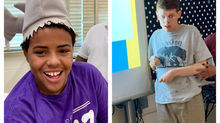This Isn't a Miracle. It's Hard Work.
- Lisa Mihalich Quinn

- Feb 3, 2023
- 4 min read
Can we stop saying that learning text-based communication is a miracle?
My pregnancy with my second child was a doozy. I was initially diagnosed with placenta previa, a fairly common condition in early pregnancy, diagnosed in about 1 in 20 women. It basically meant that the placenta - the thing that nourishes the baby alongside the umbilical cord - was blocking her exit route.
My doctor, a maternal fetal specialist, reassured us that it would likely resolve, but it meant some lifestyle changes. No more lifting my then two-year-old son. No more exercise. No building nursery furniture on my own. All these things were hard but manageable.
In the next few weeks, things changed. I had two bleeds that landed me in the hospital overnight. I was put on complete bed rest. And then, at another ultrasound appointment with my specialist, the ground completely shifted under our feet.
The specialist observed that my placenta had broken into two pieces, which were connected by blood vessels belonging to me and the baby. Now, not only was her exit route blocked, any rupture of these vessels could be fatal to her within minutes. This condition, vasa previa, is so rare that most of my labor and delivery nurses had never heard of it, let alone treated a case.

If you didn’t know that long-term hospital bed rest was a thing, now you do. I spent almost three months - 80 excruciating days - in the hospital away from my husband and son. We lived day to day, hoping this baby would cook safely inside me just ONE more week.
And she did. Under continued monitoring and treatment, she cooked for eleven more weeks. My daughter was born only four weeks premature, weighing in at just 5 pounds 2 ounces. Tiny but healthy. Small but mighty.

During the course of this experience, more people than I can count expressed something along the lines of what a miracle this all was. Isn't it a miracle that the doctors caught this? How miraculous that she survived!
At first I agreed. But the more I heard it, the more it didn’t sit right with me.
The Oxford Dictionary defines a miracle as “a surprising and welcome event that is not explicable by natural or scientific laws and is therefore considered to be the work of a divine agency.”
By that definition, labeling something as “miraculous” dismisses or diminishes the knowledge and expertise of the maternal-fetal specialist who applied decades of learning and practice to diagnose it.
It reduces the informed, calculated decisions made daily by my OB team throughout the almost three months they supervised my care at the hospital. It negates our family’s decision to follow expert advice and stay hospitalized, even when it was almost unbearable for me, my husband, and my son to live apart that long.
So how does this relate to communication practices?
Recently, more media attention has been given to nonspeaking autistic people who have learned to communicate reliably by spelling their thoughts, one letter at a time.
People once thought to be incapable of communication and lacking in intelligence, are now proving that with the right teaching and lots of hard work, they can express themselves in ways that their families and schools never believed possible.
On the surface, it’s tempting to label that as miraculous. And some books, articles, and reviews are doing just that.
But by framing the development of a reliable communication method as a miracle, we do exactly what my well-meaning family and friends did with my complicated pregnancy: we diminish the hard work of both students and teachers, and in the process we lend credibility to skeptics and naysayers who try to tell us that what we’re seeing our students do is not explicable by natural or scientific laws.
An untrained professional cannot simply hold an alphabet board in front of a nonspeaking autistic student and experience their profound communication. Most professionals who teach students to use multimodal text-based communication have years of training and experience.
We understand best practices. We know how to individualize instruction. We understand the role that prompts play in learning how to use these communication tools and the importance of fading them as our students’ skills strengthen.
Learning to use text-based communication reliably is work. It takes effort. It takes an entire shift in mindset - not just within families, but with the students themselves.

When you’ve been believed to be incapable of something your whole life and spent years listening to professionals repeatedly underestimate you, it is unlikely that you will develop self-confidence and belief in your own abilities instantaneously. It is unlikely that when presented with a board with the alphabet on it, you’ll immediately begin spelling your deepest thoughts and desires.
That would be miraculous.
Instead, what we believe in at Reach Every Voice is good teaching. Good teaching using best practices. And most of all, the hard work and persistence of our teachers, students, and their families.
We believe that all students deserve literacy instruction, whether they can use speech to produce the sounds that accompany letters or not.
We often see our students struggle at the beginning. Isn’t that true for most of us when we learn a new skill? But over time, we also see our students making progress. It’s not always linear progress, but almost no one experiences that sort of magical trajectory when learning something difficult in life.

We can and should get excited when students who have gone their entire lives struggling to communicate in a way we understand begin to express themselves using the alphabet. But let’s give them the credit and respect they deserve.
Our students' skills aren’t miracles. They're the product of hard work.























.png)

.png)



.png)



Comments